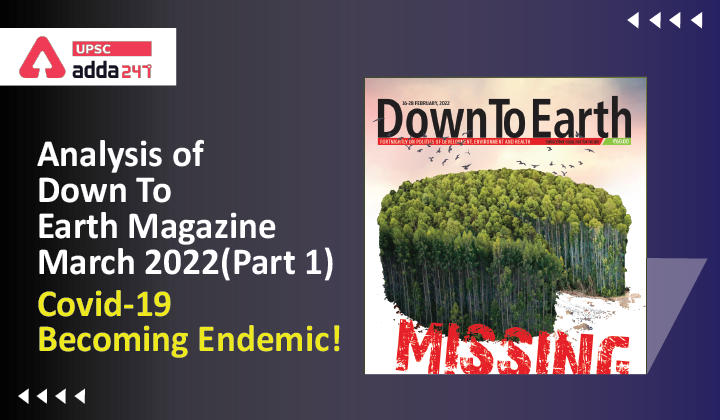Table of Contents
Analysis Of Down To Earth Magazine: ”Covid-19 Becoming Endemic!”
Relevance
”GS 2: Health, Issues Arising Out of Design & Implementation of Policies, Government Policies & Interventions”
Introduction
- It’s been two years since the World Health Organization, on March 11, 2020, officially declared a global pandemic.
- All pandemics end eventually, but the virus does not necessarily die out—so far, smallpox is the only infectious disease afflicting humans that the world has completely eradicated.
- At present, India appears to have reached the endemic stage as far as its daily COVID-19 cases are concerned.
In this stage, the population essentially learns to live with the disease. - Most others become endemic and either remain dormant or keep circulating at very low levels— ready to re-emerge at a moment’s notice.
- Many diseases, including influenza, measles, hiv/aids, cholera, malaria, chikungunya and dengue are considered endemic but continue to kill hundreds of thousands of people every year.
- Malaria, for example, is endemic in many parts of sub-Saharan Africa and causes an estimated 200 million cases every year, with about 600,000 deaths. Similarly, an estimated 2.6 million deaths occur each year because of measles.
What does endemic mean?
- The word “endemic” comes from the Greek word endēmos, which means “in the population.”
- In epidemiology, it means that the disease is always present at a baseline level. So it’s not down to zero. There are observable cases.
- But unlike a pandemic or epidemic, in which a disease’s behaviour is often surprising or unexpected, an illness that has become endemic has become more predictable.
- Epidemiologically, Covid-19 can also be defined as endemic when it exists at a predictable level that does not require society-defining interventions.
What’s next for COVID-19?
- Similar to the previous viruses that have caused pandemics, the COVID-19-causing SARS-CoV-2 will also keep on developing mutations.
- Some of these mutations may possibly cause some antigenic drift and lead to minor or major outbreaks.
- So watchfulness, disease surveillance and gene sequencing of a sample of viruses must continue so that we will not be taken by surprise by a mutant variant.

Possibility of 4th Wave in India
- Some statistical models have already begun making predictions on when the fourth wave will hit India, albeit in the midst of debates over whether a fourth wave will occur at all.
- The wave will depend on factors such as the emergence of new coronavirus variants, the population’s vaccination status, and the administration of booster doses.
Way Forward
- Covid-19 pandemic has made it explicitly clear that gains made in disease control are fragile. Unless health systems are strong. So we need to strengthen our health infrastructure.
- Testing and treatment must be made available to the most vulnerable—those with diabetes and other non-communicable diseases and with existing conditions of the lung, kidney and liver, whose immune response is not strong despite vaccination.
- Covid appropriate behaviour should always be followed in crowded places.
- In open markets, COVID-19 vaccines are more expensive. Prices can be reduced by allowing competition.
- The experience of conducting adult and adolescent vaccination drives must be used in initiatives for diseases like hepatitis B, cervical cancer and pneumococcal pneumonia.
Conclusion
It’s important to remember that endemic is not synonymous with harmless. Malaria, for example, is considered endemic in a number of countries. In 2020, the World Health Organization tallied 627,000 deaths from this mosquito-borne disease. So, we can’t lower our guards.



 TSPSC Group 1 Question Paper 2024, Downl...
TSPSC Group 1 Question Paper 2024, Downl...
 TSPSC Group 1 Answer key 2024 Out, Downl...
TSPSC Group 1 Answer key 2024 Out, Downl...
 UPSC Prelims 2024 Question Paper, Downlo...
UPSC Prelims 2024 Question Paper, Downlo...
